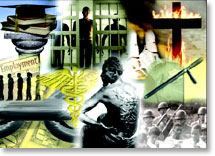CHARLENEM
Should America Pay? (FCN, 03-03-2004)

LOS ANGELES (FinalCall.com) – The near $7 billion buying power of Blacks has been duly noted, not only by companies that target them, but also by activists, like Attorney Barbara Ratliff, who believe that same spending strength can help increase the momentum in the Reparations Movement.
On Nov. 19, she launched the Reparations Selective Buying Project, which calls on all Blacks to shop with Black stores and retailers on Dec. 11 and 18.
It is not a boycott, as some people have misunderstood; it is a blackout. What we are doing is simply showing the power of Black people when we choose not to spend our money. –Attorney Barbara Ratliff
“We’re doing it this way, because we’ve been ignored and we continue to be ignored in our demand for reparations. We are being ignored in the courts and we are being ignored in the legislature,” stated Atty. Ratliff, who represents children of a slave in their lawsuit against various corporations that allegedly benefited from slavery.
The Buying Project signifies progressive steps with two dates in December, however, it may target the day after Thanksgiving next year, Atty. Ratliff informs.
The project’s three main goals are: 1) to demand reparations to compensate for unpaid labor by African slaves from 1619 to 1865, and for legal segregation and the Southern peonage system from 1865 to 1965; 2) to create pressure on the political-economic system; and 3) to begin a process of unifying people of African descent for political purposes.
“It is not a boycott, as some people have misunderstood; it is a blackout. What we are doing is simply showing the power of Black people when we choose not to spend our money,” Atty. Ratliff explained.
According to Target Market News, dubbed the Black consumer market authority, the buying power of the over 38 million Black U.S. population registered at $656 billion.
The consumer tracker reports that Blacks spent more collectively last year than Latinos or other non-White groups in virtually every consumer product and service category. The top five expenditures were $145.2 billion on housing, $56.5 billion on food, $32.6 billion for cars and trucks, $23 billion on clothes, and $18 billion for health care.
Attorney and New Panther Vanguard Movement Chairman Kwaku Durden said that it is somewhat unclear how support for the Buying Project would be assessed, but it is a first step.
“Given the closeness of the X-mas “holiday” season, we can certainly expect that some Black people will be too ‘caught-up’ in the ‘buying frenzy’ of the holidays to focus on the fact that this effort is not a ‘boycott of X-mas buying.’ However minimal the impact, efforts like this can only add to those already underway to educate the Black community about reparations and their consumer power,” he stated.
Atty. Ratliff noted that Congressman John Conyers’ bill, H.R. 40, has been languishing in the Congress for years, and believes that the Buying Project will help to move it and other justice demands forward.
H.R. 40 is the Commission to Study Reparation Proposals for African Americans Act, and was first introduced by Congressman Conyers in 1989. According to a section highlighting reparations on his website, the legislator said he has reintroduced H.R. 40 every Congress session since then, and vows to do so until it is passed into law.
Its number (40) was chosen as a symbol of the 40 acres and a mule initially promised to freed slaves by the U.S. government, according to Congressman Conyers.
“Reparations can take on many forms,” Atty. Ratliff argues. “We’re not asking for handouts or for individual checks. We are asking first of all that America apologize and it stops to examine the effects that slavery has today on the institutions of America.”












